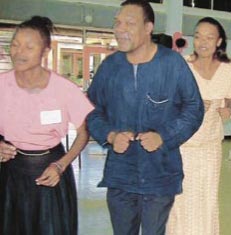|

|
|
Prof Dan Owino Kaseje, the Vice- Chancellor of Great Lakes University,
dances with his students during their graduation in April. Photo/
KENNETH OGOSIA |
Prof Dan Owino Kaseje’s triple achievements as a university don, medical
doctor and ordained priest could symbolise the three stars that led the wise
men from the East to
Jerusalem
.
A university that
is his brainchild in western Kenya is the focal point of the country’s oldest
and arguably most celebrated scholars seeking to impart knowledge to the
younger professionals away from the mainstream universities.
Aged between 60
and 80 years, the scholars, who once earned Nyanza Province the epithet “citadel
of elitism,” have teamed up to start a university near their homes, perhaps
inspired by the three wise sayings: old is gold, east or west, home is best
and experience is the best teacher. From its name, the Great Lake University
of Kisumu boasts a collection of the country’s most celebrated academicians.
The chancellor,
Prof David Wasawo, was the first black African to get a First Class honours
at Oxford University, the first black East African to teach at Makerere University
and the first African professor in East and Central Africa.
It is believed that
he was to be the first black Kenyan vice-chancellor of the University of
Nairobi, but the late Dr Josephat Njuguna Karanja caught the eyes of the late
President Jomo Kenyatta.
Now Prof Wasawo
is the head of Gluk, shorthand for Grate Lake University of Kisumu, with
a unique staff of grey-haired men. Most celebrated was the late Prof A B C
Ocholla Ayayo, but in his cohorts remain Prof Walgio Orwa, Prof Owino Okong’o
and Prof John Kokwaro, among others
Gluk emerged from
the ashes of war as the Constituent University College of
Great Lakes
University of Goma in the Democratic Republic of Congo. Prof Kaseje,
a humble Anglican Church of Kenya priest, dropped out of Maranda High School
in the 1960s due to lack of fees, earning him many years in various primary
schools. But his dedication has given western Kenya its first private, or
community university as he calls it, with a touch of philanthropy.
“It is a community
university because it was formed to pull the community out of health disasters
through public health education. I also don’t own it but the community contributes
funds locally to develop a sense of need and ownership. Membership is open
to all, ” he said in an interview.
New lease of
life
He is the vice-chancellor
who, 10 years ago, started the Tropical Institute of Community Health (Tich),
an acronym for work in Dholuo, to bring change in public health for which
Nyanza had earned a bad reputation. All the tags like cholera, HIV/Aids,
famine, poor latrine coverage and repugnant cultures trail the province. Now
the Great Lakes University of Kisumu is putting on a shine after confronting
the reality here, giving Kisumu a new lease of life. Gluk recently hosted
an international HIV/Aids conference through Sahara, at which even doctors
infected with HIV, the virus that causes Aids, found reason to break their
silence.
Prof Kaseje founded
the Great Lakes University of Kisumu on the clamour to fight HIV/Aids, which
has widely spread in Nyanza over the last two decades. It’s as if he was
born to work his way up and help people trapped in poverty, ignorance and
disease. Even learning through five primary schools in three districts as
he sought assistance from relatives and an interrupted secondary education
could not stop his quest.
Tich was coined
as an education centre for research and working with communities to combat
health problems. Prof Kaseje was touched by the plight of
students
drawn from the troubled Great Lakes countries like DRC, Rwanda and Burundi.
After retiring from
the International Federation of
Red Cross
, the World Council of Churches, the University of Nairobi and other high-level
positions, he decked his priestly collar and raised the red flag against
disasters.
His experience in
management by crisis seasoned him for what he is up against now. Prof Kaseje
evacuated students from the war-torn
Democratic
Republic of Congo’s Great Lakes University of Goma 10 years ago to a
peaceful academic environment at the shores of Lake Victoria in Kisumu,
instantly transforming the lives of many paramedics to become leading African
peacekeepers through health and humanitarian services.
Kisumu provided
a constituent college for the GLUG, located on the lava-washed city of Goma
on Lake Kivu. An integration programme that included the admission of Kenyan
public health and nurses with certificates and diplomas, changed the core
functions of paramedics known for just shuttling between messy hospitals
and markets, dealing with opportunistic diseases and consulting for HIV/Aids
projects.
Prof Kaseje says
public health officials and nurses in Kenya were blocked from becoming the
“cream of the nation,” as university graduates were referred to in those
days since doctors were the only feted professionals in the medical field.
Its core degrees were launched at a conference that brought together African
countries through the Sahara (Social Aspects of HIV/Aids and Health Research
Alliance), Universities in Solidarity with Disadvantaged Communities (Unisol,
funded by Unesco) at the Tom Mboya Labour College in Kisumu.
Unisol aims to help
paramedical professionals to grow into social health experts who can handle
the challenges of HIV/Aids, wars, trauma and cultural impediments to economic
and health provisions. Great Lakes University of Kisumu took over from Tich
and will offer undergraduate and post-graduate education.
Prof Kaseje told
the first graduands to “go out there and work very hard,” in line with Tich’s
in the local dialect. “I believe in hard work because of my very poor background,”
says the Harvard-trained scholar. “I had to change primary schools to get
my education and stayed with relatives when it became difficult for my parents.”
|


![High end business opportunity; Low entry point; [Lnk]](../../invest/highendbusiness-plaintext_asp.jpeg)
![High end travel; Low end rates; [Lnk]](../../invest/highendtravel-plaintext_asp.jpeg)
